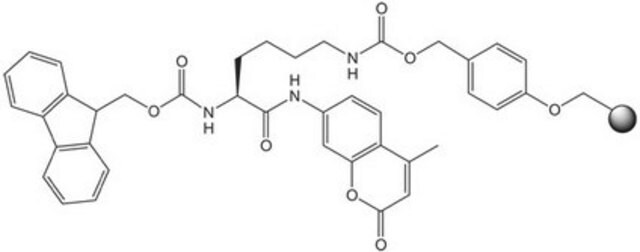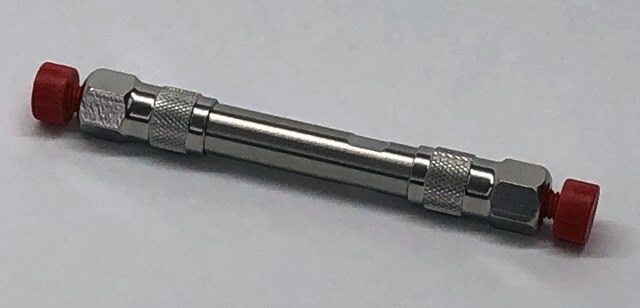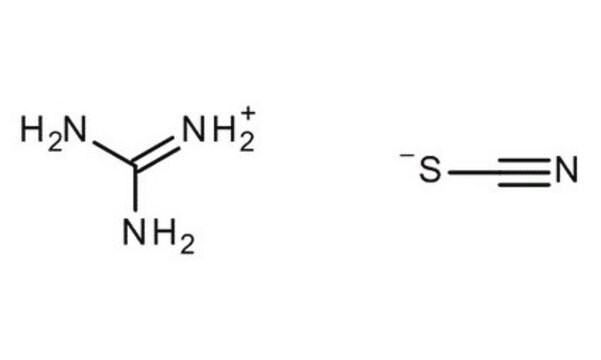14918
Atto 655 amine
suitable for fluorescence
Se connecterpour consulter vos tarifs contractuels et ceux de votre entreprise/organisme
About This Item
Code UNSPSC :
12352200
Nomenclature NACRES :
NA.32
Produits recommandés
Forme
solid
Fabricant/nom de marque
ATTO-TEC GmbH
Fluorescence
λex 663; λem 684 nm in 0.1 M phosphate pH 7.0
Adéquation
suitable for fluorescence
Température de stockage
−20°C
Description générale
Atto 655 belongs to a new generation of fluorescent labels. The dye is designed for application in the area of life science, e.g. labeling of DNA, RNA or proteins. Characteristic features of the label are strong absorption, good fluorescence quantum yield, excellent thermal and photo-stability, outstanding ozone resistance, very good water solubility, and very little triplet formation. Atto 655 is a zwitterionic dye with a net electrical charge of zero. The fluorescence is efficiently quenched by electron donors like guanine, tryptophan, etc.
The amine derivative may be used for reactions with activated carboxy-groups like NHS-esters, TFP-esters etc.
find more information here
The amine derivative may be used for reactions with activated carboxy-groups like NHS-esters, TFP-esters etc.
find more information here
Conditionnement
Bottomless glass bottle. Contents are inside inserted fused cone.
Adéquation
for coupling to activated carboxy groups
Informations légales
This product is for Research use only. In case of intended commercialization, please contact the IP-holder (ATTO-TEC GmbH, Germany) for licensing.
Code de la classe de stockage
11 - Combustible Solids
Classe de danger pour l'eau (WGK)
WGK 3
Point d'éclair (°F)
Not applicable
Point d'éclair (°C)
Not applicable
Faites votre choix parmi les versions les plus récentes :
Certificats d'analyse (COA)
Lot/Batch Number
Vous ne trouvez pas la bonne version ?
Si vous avez besoin d'une version particulière, vous pouvez rechercher un certificat spécifique par le numéro de lot.
Déjà en possession de ce produit ?
Retrouvez la documentation relative aux produits que vous avez récemment achetés dans la Bibliothèque de documents.
Ruixue Zhu et al.
The journal of physical chemistry. B, 115(17), 5001-5007 (2011-04-12)
Atto655 has been widely used as an excellent probing dye through photoinduced electron transfer (PET) for biochemical processes in oligonucleotides or polypeptides. However, its photophysical properties in the presence of the quenchers guanosine and tryptophan have not been carefully studied.
Eilon Sherman et al.
Chemphyschem : a European journal of chemical physics and physical chemistry, 12(3), 696-703 (2011-01-29)
Intramolecular dynamics in the denatured state of a protein are of importance for protein folding. Native-like contact formation within the ensemble of denatured conformations of a protein may guide its transformation towards the native conformation. The efficiency of folding is
Achim Friedrich et al.
FEBS letters, 581(8), 1644-1648 (2007-04-03)
This article presents a new, highly sensitive method for the identification of single nucleotide polymorphisms (SNPs) in homogeneous solutions using fluorescently labeled hairpin-structured oligonucleotides (smart probes) and fluorescence single-molecule spectroscopy. While the hairpin probe is closed, fluorescence intensity is quenched
Søren Preus et al.
Chembiochem : a European journal of chemical biology, 13(14), 1990-2001 (2012-09-01)
Förster resonance energy transfer (FRET) is a powerful tool for monitoring molecular distances and interactions at the nanoscale level. The strong dependence of transfer efficiency on probe separation makes FRET perfectly suited for "on/off" experiments. To use FRET to obtain
Julie M G Rogers et al.
Langmuir : the ACS journal of surfaces and colloids, 27(7), 3815-3821 (2011-03-16)
The structure and function of the influenza A M2 proton channel have been the subject of intensive investigations in recent years because of their critical role in the life cycle of the influenza virus. Using a truncated version of the
Notre équipe de scientifiques dispose d'une expérience dans tous les secteurs de la recherche, notamment en sciences de la vie, science des matériaux, synthèse chimique, chromatographie, analyse et dans de nombreux autres domaines..
Contacter notre Service technique






